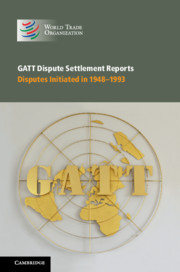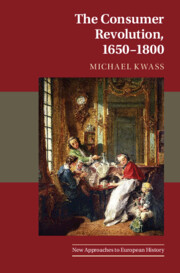Refine search
Actions for selected content:
26946 results in Economic history
Acknowledgments
-
- Book:
- Reshaping Capitalism in Weimar and Nazi Germany
- Published online:
- 20 January 2022
- Print publication:
- 03 February 2022, pp ix-x
-
- Chapter
- Export citation
Dedication
-
- Book:
- The Consumer Revolution, 1650–1800
- Published online:
- 13 January 2022
- Print publication:
- 03 February 2022, pp v-vi
-
- Chapter
- Export citation
Part III - Promoting Capitalism
-
- Book:
- Reshaping Capitalism in Weimar and Nazi Germany
- Published online:
- 20 January 2022
- Print publication:
- 03 February 2022, pp 181-254
-
- Chapter
- Export citation
5 - Semantics of Success
- from Part II - Concealing Capitalism
-
-
- Book:
- Reshaping Capitalism in Weimar and Nazi Germany
- Published online:
- 20 January 2022
- Print publication:
- 03 February 2022, pp 136-153
-
- Chapter
- Export citation
5 - Consuming Enlightenment
-
- Book:
- The Consumer Revolution, 1650–1800
- Published online:
- 13 January 2022
- Print publication:
- 03 February 2022, pp 133-157
-
- Chapter
- Export citation
Index
-
- Book:
- Reshaping Capitalism in Weimar and Nazi Germany
- Published online:
- 20 January 2022
- Print publication:
- 03 February 2022, pp 305-316
-
- Chapter
- Export citation
Acknowledgments
-
- Book:
- The Consumer Revolution, 1650–1800
- Published online:
- 13 January 2022
- Print publication:
- 03 February 2022, pp x-x
-
- Chapter
- Export citation
3 - Going Shopping
-
- Book:
- The Consumer Revolution, 1650–1800
- Published online:
- 13 January 2022
- Print publication:
- 03 February 2022, pp 75-98
-
- Chapter
- Export citation
Copyright page
-
- Book:
- The Consumer Revolution, 1650–1800
- Published online:
- 13 January 2022
- Print publication:
- 03 February 2022, pp iv-iv
-
- Chapter
- Export citation
Illustrations
-
- Book:
- Reshaping Capitalism in Weimar and Nazi Germany
- Published online:
- 20 January 2022
- Print publication:
- 03 February 2022, pp vii-vii
-
- Chapter
- Export citation
THE BRAZILIAN ECONOMY DURING THE OLD REGIME CRISIS (1750-1807)
-
- Journal:
- Revista de Historia Economica - Journal of Iberian and Latin American Economic History / Volume 41 / Issue 1 / March 2023
- Published online by Cambridge University Press:
- 28 January 2022, pp. 119-146
- Print publication:
- March 2023
-
- Article
- Export citation

Reshaping Capitalism in Weimar and Nazi Germany
-
- Published online:
- 20 January 2022
- Print publication:
- 03 February 2022
FHR volume 28 issue 3 Cover and Front matter
-
- Journal:
- Financial History Review / Volume 28 / Issue 3 / December 2021
- Published online by Cambridge University Press:
- 20 January 2022, pp. f1-f2
-
- Article
-
- You have access
- Export citation
FHR volume 28 issue 3 Cover and Back matter
-
- Journal:
- Financial History Review / Volume 28 / Issue 3 / December 2021
- Published online by Cambridge University Press:
- 20 January 2022, pp. b1-b4
-
- Article
-
- You have access
- Export citation

GATT Dispute Settlement Reports
- Disputes Initiated in 1948–1993
-
- Published online:
- 13 January 2022
- Print publication:
- 19 November 2020

The Consumer Revolution, 1650–1800
-
- Published online:
- 13 January 2022
- Print publication:
- 03 February 2022
Appendix to Chapter 3
-
- Book:
- The Wealth and Poverty of African States
- Published online:
- 06 January 2022
- Print publication:
- 13 January 2022, pp 147-151
-
- Chapter
- Export citation
2 - Seeing Like an African State in the Twentieth Century
-
- Book:
- The Wealth and Poverty of African States
- Published online:
- 06 January 2022
- Print publication:
- 13 January 2022, pp 39-62
-
- Chapter
- Export citation
Bibliography
-
- Book:
- The Wealth and Poverty of African States
- Published online:
- 06 January 2022
- Print publication:
- 13 January 2022, pp 158-175
-
- Chapter
- Export citation
Notes
-
- Book:
- The Wealth and Poverty of African States
- Published online:
- 06 January 2022
- Print publication:
- 13 January 2022, pp 152-157
-
- Chapter
- Export citation
